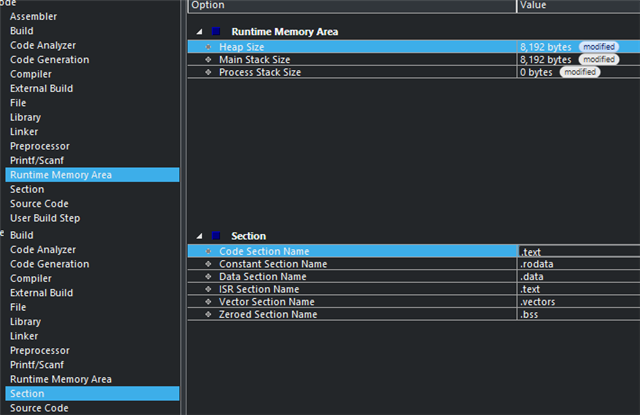Hello,
I'm trying to transition from using the SES example projects to using the ARM GCC projects. While testing out code using the armgcc projects, I've noticed that placing variables in "non_init" section will not retain any values after pressing the reset button.
This is the snippet of code I'm using to test whether the variables are being initialized or not. It appears to work just fine when tested using the SES examples, but I cannot get it to work when I try switching to armgcc.
uint32_t testValue1 __attribute__((section(".retained_section")));
int main(void) {
if (NRF_POWER->RESETREAS == 0) {
testValue1 = 0x37;
}
else {
NRF_LOG_INFO("Test values check %08x", testValue1);
}
}
The flash_placements.xml file contains a field below which is what I'm assuming is allowing the no-initialization variables to work.
<ProgramSection alignment="4" load="No" name=".non_init" />
However when I look within the armgcc linker script it doesn't appear to match with the flash_placements.xml file.
/* Linker script to configure memory regions. */
SEARCH_DIR(.)
GROUP(-lgcc -lc -lnosys)
MEMORY
{
FLASH (rx) : ORIGIN = 0x27000, LENGTH = 0xd9000
RAM (rwx) : ORIGIN = 0x20002af8, LENGTH = 0x3d508
}
SECTIONS
{
. = ALIGN(4);
.mem_section_dummy_ram :
{
}
.cli_sorted_cmd_ptrs :
{
PROVIDE(__start_cli_sorted_cmd_ptrs = .);
KEEP(*(.cli_sorted_cmd_ptrs))
PROVIDE(__stop_cli_sorted_cmd_ptrs = .);
} > RAM
.fs_data :
{
PROVIDE(__start_fs_data = .);
KEEP(*(.fs_data))
PROVIDE(__stop_fs_data = .);
} > RAM
.log_dynamic_data :
{
PROVIDE(__start_log_dynamic_data = .);
KEEP(*(SORT(.log_dynamic_data*)))
PROVIDE(__stop_log_dynamic_data = .);
} > RAM
.log_filter_data :
{
PROVIDE(__start_log_filter_data = .);
KEEP(*(SORT(.log_filter_data*)))
PROVIDE(__stop_log_filter_data = .);
} > RAM
} INSERT AFTER .data;
SECTIONS
{
.mem_section_dummy_rom :
{
}
.sdh_soc_observers :
{
PROVIDE(__start_sdh_soc_observers = .);
KEEP(*(SORT(.sdh_soc_observers*)))
PROVIDE(__stop_sdh_soc_observers = .);
} > FLASH
.sdh_ble_observers :
{
PROVIDE(__start_sdh_ble_observers = .);
KEEP(*(SORT(.sdh_ble_observers*)))
PROVIDE(__stop_sdh_ble_observers = .);
} > FLASH
.pwr_mgmt_data :
{
PROVIDE(__start_pwr_mgmt_data = .);
KEEP(*(SORT(.pwr_mgmt_data*)))
PROVIDE(__stop_pwr_mgmt_data = .);
} > FLASH
.sdh_req_observers :
{
PROVIDE(__start_sdh_req_observers = .);
KEEP(*(SORT(.sdh_req_observers*)))
PROVIDE(__stop_sdh_req_observers = .);
} > FLASH
.sdh_state_observers :
{
PROVIDE(__start_sdh_state_observers = .);
KEEP(*(SORT(.sdh_state_observers*)))
PROVIDE(__stop_sdh_state_observers = .);
} > FLASH
.sdh_stack_observers :
{
PROVIDE(__start_sdh_stack_observers = .);
KEEP(*(SORT(.sdh_stack_observers*)))
PROVIDE(__stop_sdh_stack_observers = .);
} > FLASH
.nrf_queue :
{
PROVIDE(__start_nrf_queue = .);
KEEP(*(.nrf_queue))
PROVIDE(__stop_nrf_queue = .);
} > FLASH
.nrf_balloc :
{
PROVIDE(__start_nrf_balloc = .);
KEEP(*(.nrf_balloc))
PROVIDE(__stop_nrf_balloc = .);
} > FLASH
.cli_command :
{
PROVIDE(__start_cli_command = .);
KEEP(*(.cli_command))
PROVIDE(__stop_cli_command = .);
} > FLASH
.crypto_data :
{
PROVIDE(__start_crypto_data = .);
KEEP(*(SORT(.crypto_data*)))
PROVIDE(__stop_crypto_data = .);
} > FLASH
.log_const_data :
{
PROVIDE(__start_log_const_data = .);
KEEP(*(SORT(.log_const_data*)))
PROVIDE(__stop_log_const_data = .);
} > FLASH
.log_backends :
{
PROVIDE(__start_log_backends = .);
KEEP(*(SORT(.log_backends*)))
PROVIDE(__stop_log_backends = .);
} > FLASH
} INSERT AFTER .text
INCLUDE "nrf_common.ld"
I thought I could simply copy and paste the auto-generated ld file from SES, but it will not compile after making the change.
Compiling file: main.cpp Linking target: _build/nrf52840_xxaa.out c:/program files (x86)/gnu arm embedded toolchain/9 2020-q2-update/bin/../lib/gcc/arm-none-eabi/9.3.1/../../../../arm-none-eabi/bin/ld.exe: _build/nrf52840_xxaa.out section `.fini' will not fit in region `UNPLACED_SECTIONS' c:/program files (x86)/gnu arm embedded toolchain/9 2020-q2-update/bin/../lib/gcc/arm-none-eabi/9.3.1/../../../../arm-none-eabi/bin/ld.exe: region `UNPLACED_SECTIONS' overflowed by 5 bytes c:/program files (x86)/gnu arm embedded toolchain/9 2020-q2-update/bin/../lib/gcc/arm-none-eabi/9.3.1/../../../../arm-none-eabi/bin/ld.exe: c:/program files (x86)/gnu arm embedded toolchain/9 2020-q2-update/bin/../lib/gcc/arm-none-eabi/9.3.1/../../../../arm-none-eabi/lib/thumb/v7e-m+fp/hard\libg_nano.a(lib_a-signalr.o): in function `_kill_r': signalr.c:(.text._kill_r+0xe): undefined reference to `_kill' c:/program files (x86)/gnu arm embedded toolchain/9 2020-q2-update/bin/../lib/gcc/arm-none-eabi/9.3.1/../../../../arm-none-eabi/bin/ld.exe: c:/program files (x86)/gnu arm embedded toolchain/9 2020-q2-update/bin/../lib/gcc/arm-none-eabi/9.3.1/../../../../arm-none-eabi/lib/thumb/v7e-m+fp/hard\libg_nano.a(lib_a-signalr.o): in function `_getpid_r': signalr.c:(.text._getpid_r+0x0): undefined reference to `_getpid' collect2.exe: error: ld returned 1 exit status
Why are the armgcc linker scripts not identical to what is generated for the SES projects? If I modify the linker script as shown in this thread the value will be retained. The thread isn't regarding nrf52840, and doesn't appear to be how the auto-generated ld file from SES does it so I'm not confident whether the thread is applicable for me.
From NRF52 SES Flash Placement File (.xml) to GNU Linker script file (.ld)



